And at long last, we make it to the quarterbacks. Not that this is a particularly auspicious threshold to cross. This is a pretty weak quarterback class, but also an interesting one. There are no surefire stars like there have been the past couple years, but there are a lot of players who do some things really well, and other things a bit less impressively.
Carson Strong, Nevada
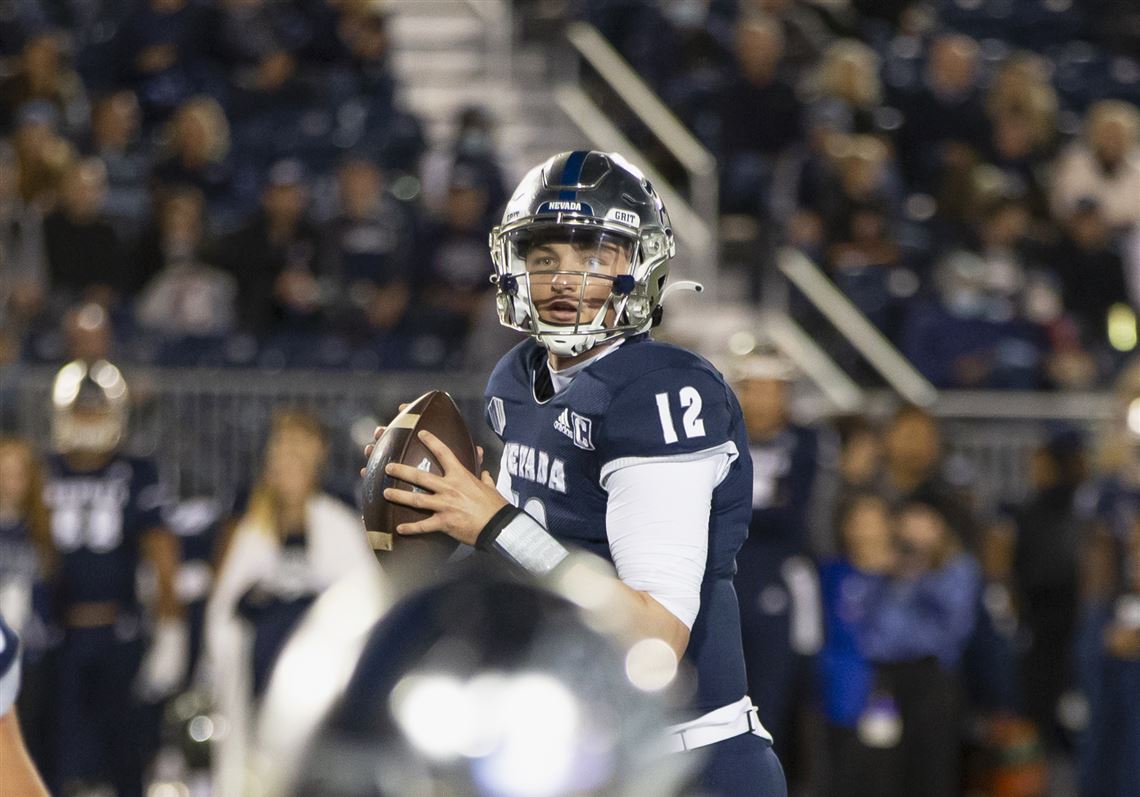
It’s become common in recent years to question whether a young quarterback can succeed without having mobility as a tool in his game. Traditional pocket passers who have entered the league over the past decade like Jameis Winston, Jared Goff, and Josh Rosen have ranged from disappointments to disasters, while most of the best young quarterbacks pose a threat with their legs. Last year was a bit of a reversal of this though, as both Mac Jones and Davis Mills had solid rookie seasons while the Super Bowl was won by Matthew Stafford. But it’s still a concern, and I understand this being a reason many people are skeptical about Strong.
Strong isn’t just a poor athlete, he’s one of the least mobile quarterbacks I’ve studied. Every now and then he can drift to his right and make a play down the field, but for the most part he never leaves the pocket. He isn’t a complete statue back there however, as he has good instincts for maneuvering within the pocket to avoid pressure and give himself an extra beat or two to throw. He is very good at keeping a steady base under himself as he does so, but he doesn’t even need this, as he has the arm strength to make throws down the field even if his feet aren’t perfect beneath him.
The arm is what we really need to talk about with Strong, because it is comfortably the best of any quarterback in this class. He fires lasers all over the field, opening throwing lanes that most other quarterbacks can’t hit. He throws a gorgeous deep ball as well, placing it with precision down the field into tight windows. His receivers gave him very little to work with at Nevada, but he made the most of the space he had.
This isn’t to say Strong is some maestro in the pocket. He has rough patches there that he’ll need to iron out moving forward. He’s generally accurate with his passes, but he isn’t always precise, which means he hits his receivers but not always in the best spot, making catches more difficult and robbing them of some opportunities after the catch. He has some work to do mentally as well. He sometimes manipulates coverage with his eyes but also will occasionally lock in on receivers, leading defenders to where he’s headed with the football. And when he does find an open receiver, he doesn’t always anticipate the space they have, leading him to hold the ball a little longer than he should.
These are things that many young quarterbacks struggle with, and if given opportunity Strong has the potential to get past them and develop into a top ten quarterback in the league. Whether he gets that opportunity is the challenging part. I would be fine grabbing Strong in the middle of the first round, but I seem higher on him than most people. And there are a couple reported red flags that could scare teams away from him. He had a leg surgery in high school that likely caused some of his mobility issues, and while I’m not a doctor, it certainly doesn’t sound pleasant. And he also reportedly did not interview well at the Combine, though I don’t know enough about this to weigh it into my evaluation. I think Strong has potential to develop, but he also has potential to turn into absolutely nothing. And it’s mostly due to the weakness of this class that he finds himself at the top of my list.
Malik Willis, Liberty

Willis is your guy if you feel like taking a big swing this year. There’s no question that he is at a different level of physical talent than everyone else in this class. As an athlete he is in the rarified air of someone like Lamar Jackson or Kyler Murray, not just a good runner for a quarterback but a good runner for any position. He has the strength to bounce off of contact, the speed to run away from people, the agility to make tacklers miss, and the instincts to turn a good play into a great one. He opens up an entire playbook of rushing plays for an offense and forces a defense to fundamentally change how it plays, knowing at any moment he could break from the pocket and make everyone miss on his way to the endzone.
Now the downside: he is currently bad at pretty much everything you could ask a quarterback to do. His accuracy is all over the place, alternating plays of breathtaking precision with throws that end up nowhere near their intended target. In college he rarely went past a single read, and at times that meant forcing the ball into double or even triple coverage. His second option was pretty much always to break out of the pocket, even if he wasn’t under pressure and there was nowhere to go. As many plays as he made with his legs, he took away just as many running into trouble. He has no feel for the pocket and allows himself to be regularly stripped from behind, which when combined with his poor decision making as a passer means he hands the ball to the other team a lot.
Still, there are moments. When he hits a laser throw into the hole between a cornerback and a safety. When he drops a deep ball perfectly into the basket fifty yards down the field. When he breaks out of the pocket and turns a play where there was nothing into a huge gain. These moments aren’t frequent enough to be anything more than moments, but they aren’t rare enough to be flukes either. Every game there are about ten plays where he looks like the best quarterback in the world.
Drafting Willis is the ultimate gamble. I think there’s a better chance than not that he’ll be an actively bad quarterback, the sort of player who sinks his team’s hopes every time he steps onto the field and is run out of the league in three seasons (or at the very least, forced to change positions). But if he can grow as a player and turn those ten plays a game into more than just that, he’ll turn his team into Super Bowl contenders for the next decade. The odds are long, but the payoff is high enough that I still couldn’t bring myself to let him fall out of the first round.
Bailey Zappe, Western Kentucky

It’s hard to think of two quarterback prospects with less in common than Willis and Zappe. Zappe is a veteran, polished quarterback who would likely be able to start in the NFL tomorrow if needed, but his mediocre physical tools mean that he has limited upside. He isn’t much of an athlete, and the limited success he finds rushing is mostly because he’s very good at picking his spots. And while I think his arm strength is functional enough to be an NFL quarterback, the ball tends to tail off whenever he tries to push it down the field, which could limit his ability to push defenses backwards in the NFL.
I still think that in the right circumstances Zappe could turn into a league average starting quarterback. He’s a very accurate passer, doing a good job throwing his receivers open and giving them opportunity to run after the catch. He didn’t go through a lot of complicated reads in college, but when his first option was uncovered he was very good at finding a way to improvise and create down the field. Sometimes he can be a little oblivious to pressure, and he’ll probably take some sacks he shouldn’t, but he also does a good job moving through the pocket and keeping his eyes downfield to make a play.
If I have one major concern about Zappe, it’s that I’m not sure exactly how advanced he is in the mental game. He had complete mastery of the offense he was running at Western Kentucky, but it was also his fourth year in what is a relatively simple system, so it shouldn’t be a surprise that he had it down. So much of his game relies on being mentally a step ahead of the defense, and while I think he should have no trouble picking up an NFL offense, there’s some risk there. I’d still grab him if I was a quarterback-needy team in the second round, but the upside is limited, and I wouldn’t be jumping for joy at the prospect.
Matt Corral, Ole Miss
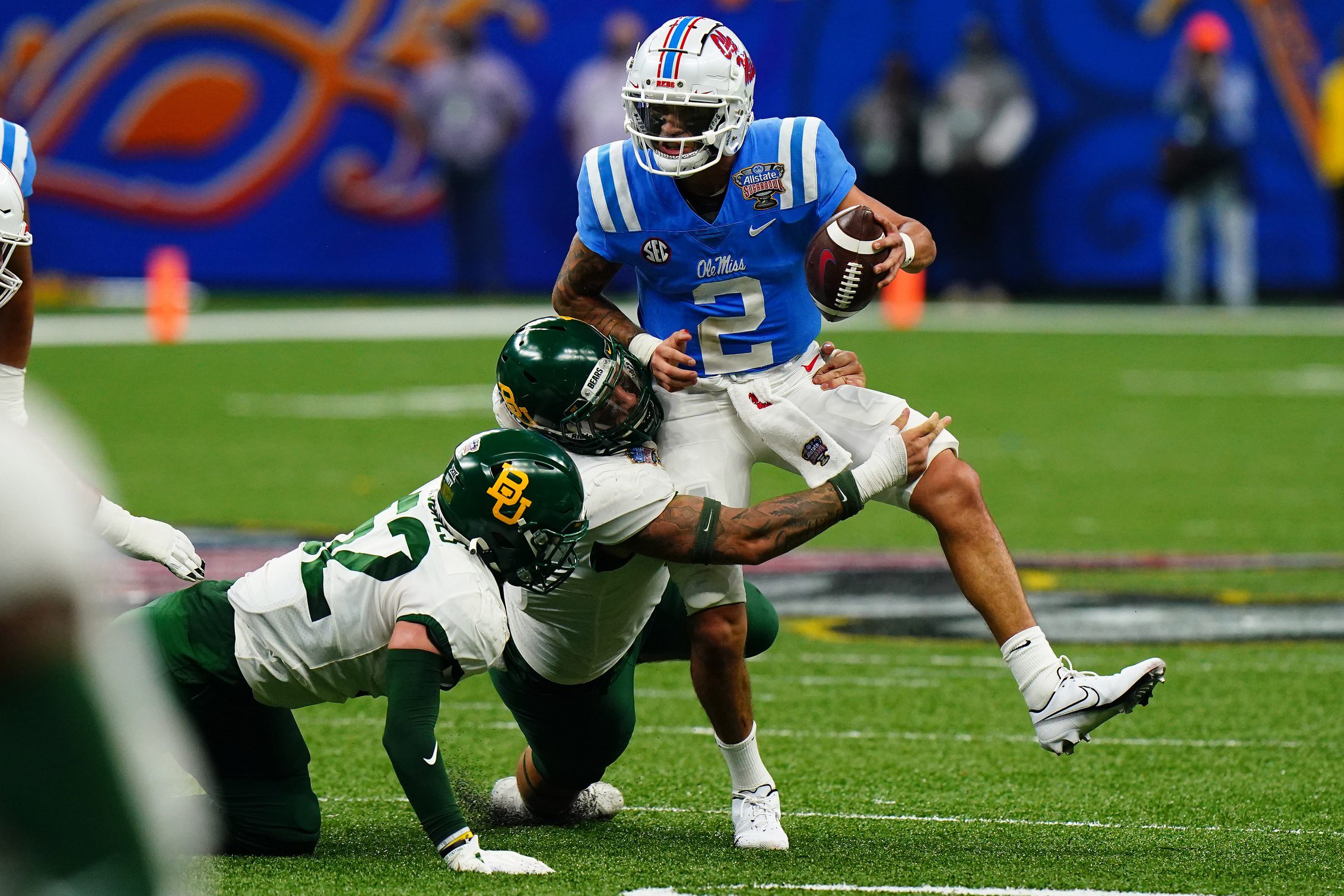
Corral is another quarterback that comes from a very simplified system, so projecting him into the NFL requires making some assumptions and leaning on his tools. And unfortunately in this case, Corral’s tools don’t really impress me. He was a productive runner in college, but I never really saw him do anything special, as his success on the ground came mostly from a combination of good blocking and toughness on his part. He may be useful some in the red zone, but I don’t think he’ll be a running threat anywhere near Willis in the NFL. He doesn’t wow me with his arm strength either. When he needs to uncork with a lot of velocity it requires a big windup, and when he tries to throw deep the ball tends to hang in the air and then come down short, giving defenders plenty of opportunity to claim it for themselves.
There are things to like about Corral, which is why I have him ranked at the top of the group of quarterbacks I feel have no real future as starters in the NFL. The toughness shows up in his passing game as much as his running. He is indifferent to pressure in the pocket, which at times means taking sacks he shouldn’t, but also means a willingness to stand in and deliver the ball on target. And when he breaks contain he is very dangerous, never panicking and always ready to attack down the field. Within structure he’s very good on RPO plays where he gets the ball out of his hands quickly, identifying the best opportunity the moment the ball is snapped and getting it out usually (but not always) on target.
My main complaint with Corral is that I never saw any high-level throws. Some of this was the system, where every pass seemed to be either a slant, screen, or go. When he was asked to read a more complicated play, he did a decent job getting to later targets, but he still only ever threw the ball if he had an easy completion. He rarely attacks the intermediate part of the field, perhaps because he doesn’t trust his reads or his arm. I suppose there’s an outside chance that he can pick this up if he’s asked to do it more in the NFL, but even then I see his upside as a low-end starter, and I’d feel more comfortable grabbing him to be a backup in the third or fourth round.
Kenny Pickett, Pitt
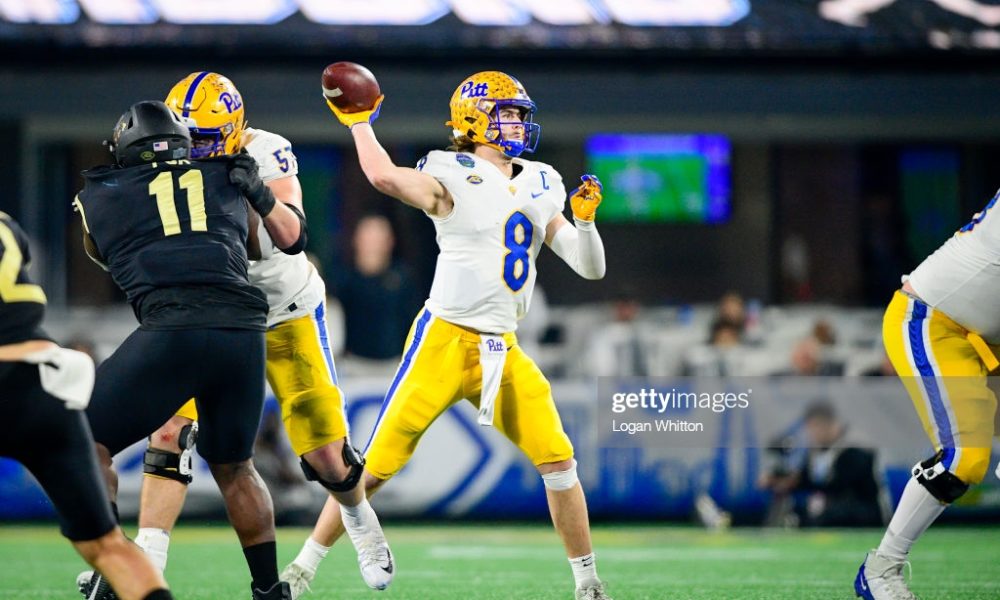
Pickett’s reputation headed into the draft is as a fairly bland, fairly safe prospect with limited upside and limited downside, much as I just described Zappe and Corral. I can see some of that, and I do agree that Pickett will ultimately be best suited in a backup role. But when I watch him I see someone a bit more erratic like Strong and Willis, capable of high-level throws and also extreme negative plays. The difference I see is that his physical tools are below the two I would consider starters, and he has a lot more college experience so is likely further along his development curve with less room to improve his failings.
Pickett can make some gorgeous throws down the field, fitting the ball with precision into tight windows for big plays. It’s frustrating how inconsistently this happens though, and how often he seems simply unwilling to try. His accuracy swings wildly over the course of the game, sometimes pinpoint twenty yards down the field and other times forcing receivers to make leaping catches on simple drag routes right in front of him. He checked the ball down to his running backs more than every other quarterback I saw combined, and rarely was it because he was under pressure or because there was an opportunity in the flat. Mostly he seems to hit about three seconds in his head and immediately turn to his release valve, even if there isn’t actually anywhere to go with the ball there.
This internal clock is the biggest problem I see with Pickett, and what I think will likely hold him back if he ever gets a chance to start in the NFL. He is capable of going deep into his progressions, but very often he simply doesn’t bother. He drops back, checks his first and maybe his second receiver, and then immediately bails from the pocket. Most of the time he wasn’t even being pressured, and was actually running into more trouble. He’s a good athlete and can make plays on the ground, and he throws some very nice passes on broken plays when moving to his right. But he also regularly creates sacks out of comfortable pockets, the sort of negative plays that will absolutely sink an offense. For someone like Willis, the high-level plays are thrilling enough that I might be willing to bear this. For Pickett even his best moments are merely pretty good, and I don’t think that makes him worth more than a fourth round selection.
Sam Howell, North Carolina
Howell is the best physical talent of the non-Willis quarterbacks I studied, but that’s more a statement about the weakness of the rest of this class than any great praise for Howell. He has a strong enough arm to make the throws he needs to make without creating anything special, and he’s a good enough athlete to pick up yards on the ground without really intimidating a defense with his mobility. He has the sort of tools that are pretty average for a starting NFL quarterback these days, and even if he develops into the best version of himself he’s probably just a middle of the pack starter.
That’s a tough beat because, again excluding Willis, he’s the farthest from being NFL-ready of the quarterbacks I looked at. The biggest problem he has is that he thinks he’s better than he is. He’s constantly trying to turn everything into a big play, either breaking out of a clean pocket to try to run or throwing the ball deep into coverage. The team around him at North Carolina was bad, and often his heroics were the only thing that made their offense work at all. But just as frequently he made baffling decisions that led to crippling negative plays.
To turn Howell into an NFL starter you will likely need to overhaul his mechanics to improve his scattershot accuracy, teach him how to run a system with more than single-reads and RPOs, and hope that he figures out his own limitations before getting himself killed. Maybe two or three years down the road he could turn into something, but I think the most likely scenario for him is a backup with just enough flare to hold things down for a game or two if needed. The upside is limited, and it will take a lot of work to get there, which is why I wouldn’t spend anything more than a throwaway fifth-round pick on him.
Desmond Ridder, Cincinnati
Ridder is a name that has been climbing up draft boards for the past few weeks, to the point that a lot of people expect him to be selected in the first round, if not as the first quarterback overall. And even though I personally don’t see starting potential in Ridder to make him worth more than a fifth-round pick, I at least understand why some teams may be impressed by him. He’s probably the most mentally advanced of the quarterbacks I studied, capable of processing what’s happening on the field in front of him very quickly. I’m sure he has done wonderfully in interviews, and he put together good time in the athletic tests at the Combine. And the less time you spend actually watching Ridder play football, the more easily you can talk yourself into him being a good football player.
The first big problem with Ridder is accuracy. When the ball comes out of his hands, it’s really a coin flip whether it’s going to end up where he intends it. He misses open receivers far more often than any of the other quarterbacks I studied, and unlike some of the others who struggled with accuracy, there were very few tight-window throws that made me think there was something to be found if he could clean that up. Ridder relies heavily on his processing to identify open receivers, because he isn’t the sort of quarterback who’s going to create opportunities for covered targets.
Ridder isn’t as impressive physically as he looks off the field either. His arm strength seems good enough to get the ball to the sidelines on intermediate throws, but he’s really bad on deep balls, with his passes often coming up short and giving defenders opportunities to make plays on the ball. And as good an athlete as he is, he never seemed particularly interested in running with the football. Maybe this will change in the NFL, but for right now I don’t see him as much of a rushing threat.
So the question is, what is the upside for Ridder? He’s already advanced mentally, so there isn’t as much room to grow there. He has little things down that many young quarterbacks lack, like a willingness to adjust the trajectory of his throws to drop a ball in with touch. Though even here he can run into trouble, as at times he seems to forget about safeties over the top and lead a tear-drop into double or triple coverage. He doesn’t have super impressive physical tools, and he isn’t great outside of structure. He panics under pressure and has a tendency to try to throw the ball off his back foot, leaving it floating over the middle for anyone to claim. In five or six years he’ll be a good quarterback to have around as a backup to help develop an actually talented younger player. For now however, I’m not sure what value he actually provides.
No comments:
Post a Comment